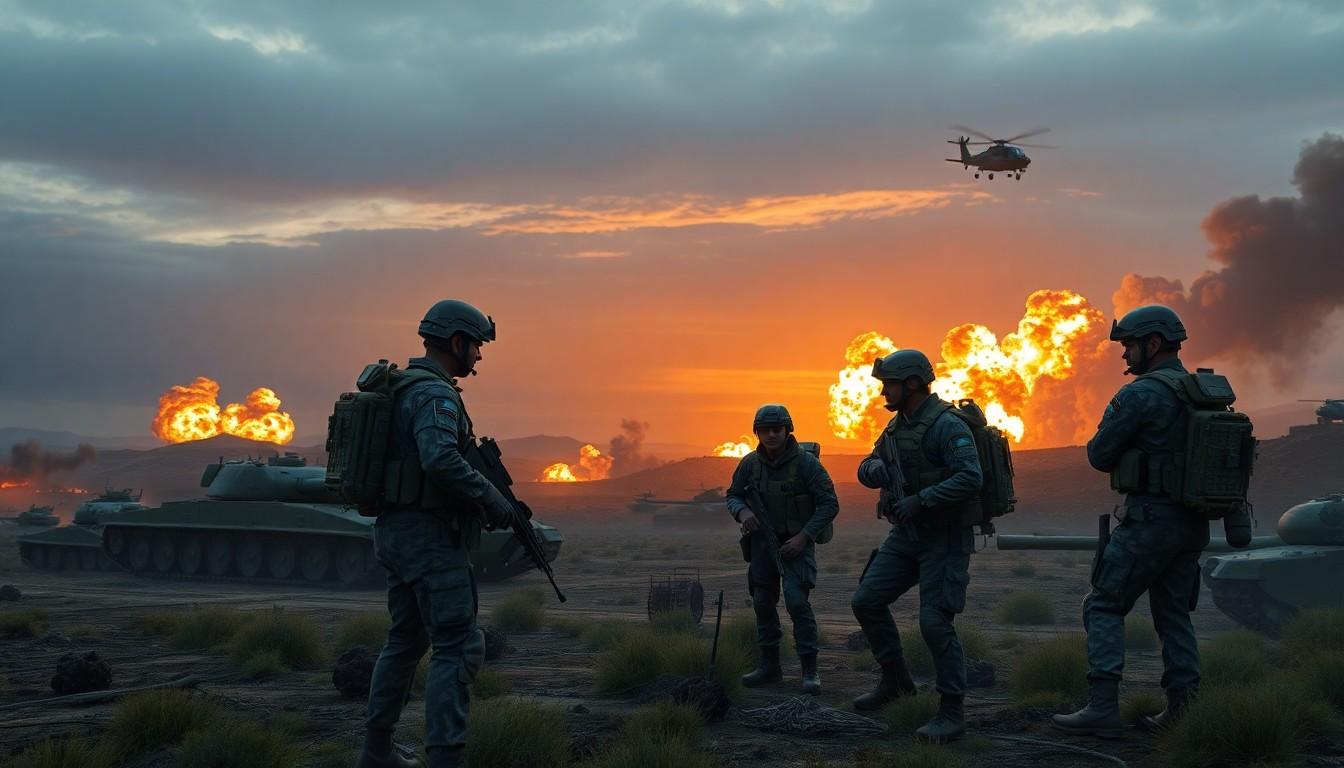Table of Contents
ToggleBattlefield games have a knack for turning ordinary players into virtual soldiers, and who doesn’t want to feel like a hero, even if it’s just from the comfort of their couch? With explosive action, strategic gameplay, and a touch of chaos, this franchise has captured the hearts of gamers worldwide. Whether you’re a lone wolf or a team player, there’s a battlefield waiting for you.
From the trenches of World War I to modern-day warfare, each installment offers unique experiences that keep players coming back for more. This article dives into the ultimate battlefield game list, showcasing the titles that have defined the franchise and left players shouting “for glory!” So grab your gear and get ready to explore the epic battles that have made Battlefield a household name in gaming.
Overview Of The Battlefield Game Series
The Battlefield game series stands out for its immersive gameplay and large-scale battles. Players engage in intense combat across diverse settings, including historic wars and futuristic conflicts. Popular titles span various timelines, from World War I in “Battlefield 1” to the modern warfare depicted in “Battlefield 2042.”
Exploration of the series reveals a blend of solo campaigns and multiplayer experiences. Each installment emphasizes teamwork and strategy. Players can choose from various classes, vehicles, and weapons, enhancing personalization and tactical choices during gameplay.
Notable entries in the franchise like “Battlefield 1942” and “Battlefield: Bad Company 2” made significant impacts on the gaming landscape. The franchise consistently delivers stunning graphics and realistic environments, immersing players in the action. Battle mechanics encourage cooperation, allowing squads to conquer objectives together.
Innovations such as destructible environments add an extra layer of strategy. Players must adapt to changing landscapes during battles, ensuring no two encounters feel the same. Emphasis on user-generated content in some titles has also fostered a dedicated community, enhancing the game’s longevity.
The series continues to attract new players while maintaining a loyal fanbase. As technology advances, expectations shift, and Battlefield adapts. Upcoming titles promise to uphold the franchise’s legacy while introducing fresh dynamics that captivate gamers worldwide.
Key Features Of Battlefield Games
Battlefield games stand out due to their blend of intense combat and strategic gameplay elements. These features create a compelling gaming experience that appeals to a diverse range of players.
Multiplayer Experience
Multiplayer serves as the cornerstone of Battlefield’s appeal. Players can join large-scale battles featuring up to 128 participants on expansive maps. Teams must collaborate effectively to achieve objectives, fostering an environment of communication and strategy. Modes like Conquest and Rush emphasize teamwork while accommodating different playstyles. Regular updates introduce new content, keeping the multiplayer experience fresh and engaging. Gamers often find themselves immersed in dynamic battles filled with vehicles, gadgets, and destructible environments, enhancing overall gameplay.
Single-Player Campaigns
Single-player campaigns explore rich narratives within unique historical settings. Players engage with compelling stories that highlight personal and thematic conflicts relevant to each era. These campaigns feature varied gameplay, from stealth approaches to action-packed sequences. Missions often include diverse objectives, requiring players to adapt their strategies. The experience allows players to understand the context of battles and characters, adding depth to the overall game. Well-crafted campaigns not only showcase the game’s mechanics but also extend the Battlefield experience beyond multiplayer, appealing to story-driven gamers.
Battlefield Game List
The Battlefield series features a rich array of titles that have defined gaming experiences. It includes mainline games and expansions, catering to both single-player and multiplayer enthusiasts.
Original Titles
Original titles form the backbone of the franchise, starting with “Battlefield 1942” in 2002. “Battlefield Vietnam,” released in 2004, introduced gritty jungle warfare. 2005’s “Battlefield 2” focused on modern combat, while “Battlefield 3,” debuting in 2011, brought advancements in graphics and gameplay mechanics. The franchise’s reputation grew with titles like “Battlefield 4” and “Battlefield 1,” showcasing World War I battles. 2018’s “Battlefield V” returned to World War II, offering fresh perspectives on familiar conflicts. Each original title built and expanded upon previous innovations, attracting a dedicated player base.
Spin-offs And Expansions
Spin-offs and expansions further enriched the Battlefield experience. “Battlefield: Bad Company” launched in 2008, blending humor and military action with a unique single-player campaign. “Battlefield Hardline,” released in 2015, shifted focus to police versus criminal scenarios within urban environments. The series also introduced several expansion packs, such as “Battlefield 4: China Rising,” which expanded maps and gameplay options. These additions keep gameplay fresh while introducing new mechanics and storylines, enhancing player engagement across the franchise.
Recent Releases
Recent releases have revitalized the franchise, capturing a new generation of gamers. “Battlefield 2042,” launched in November 2021, brought futuristic features and massive online battles accommodating up to 128 players. New gameplay mechanics like Specialists replaced traditional classes, allowing for diverse playstyles. “Battlefield 2042” also introduced dynamic weather and environmental destruction, increasing immersion in combat scenarios. Regular updates and seasonal content have continued to evolve gameplay, ensuring it remains engaging and relevant in the current gaming landscape.
The Evolution Of Gameplay Mechanics
Battlefield has undergone significant changes in gameplay mechanics since its inception, adapting to modern gaming trends and player expectations. Initial titles focused on basic combat mechanics, emphasizing the chaos of battle through stunning graphics and expansive maps. Gradually, the franchise integrated complex systems like destructible environments, which allow players to manipulate the battlefield strategically.
Multiplayer functionality expanded, accommodating up to 128 players, ensuring massive, immersive battles. Modes like Conquest and Rush offer diverse gameplay experiences, encouraging teamwork and strategy among participants. Unique classes and customizable loadouts enhance player agency, letting individuals tailor their playstyles to specific combat scenarios.
Recent installments, especially Battlefield 2042, introduced futuristic mechanics, integrating advanced technology and varied environments. These changes provide new tactical opportunities, allowing for innovative gameplay approaches. Additionally, seasonal updates consistently refresh content, introducing new maps, modes, and rewards, keeping the player base engaged and invested.
Single-player campaigns have also evolved, introducing intricate narratives that enhance emotional connections to characters. Varied gameplay styles within these campaigns enable players to experience different aspects of warfare, adding layers to the overall Battlefield experience. As technology progresses, Battlefield continues to enhance its gameplay mechanics, ensuring relevance and excitement in an ever-changing gaming landscape.
Community Reception And Critiques
Community reception of Battlefield games varies significantly across different titles. Players often praise early entries like “Battlefield 1942” and “Battlefield 3” for their groundbreaking multiplayer experiences and well-executed mechanics. Critiques surfaced for certain sales and updates in “Battlefield 2042,” where players expressed disappointment due to technical issues and gameplay balance problems.
Diverse opinions emerge regarding the franchise’s direction. While some players appreciate the futuristic elements introduced in recent titles, others prefer the historical contexts that defined earlier games. Engaging maps and large player counts remain highlights, consistent across the series. Complaints about matchmaking and server stability frequently arise, especially following major updates.
Developers frequently respond to community feedback by implementing patches and adjustments, aiming to enhance player experience. A significant portion of the fanbase remains loyal, drawn to the thrill of large-scale combat and immersive environments. Multiplayer modes like Conquest and Rush consistently receive acclaim for promoting team strategies.
Fans also value single-player campaigns, though some criticize certain narratives for lacking depth. Continuous seasonal updates often rejuvenate the gameplay, retaining player interest and improving overall satisfaction. The evolution of gameplay mechanics keeps the franchise competitive and relevant in the ever-changing landscape of gaming.
User reviews highlight the balance between innovative features and traditional gameplay elements. Dedicated gamers maintain enthusiasm for what lies ahead in the series, reflecting their investment in the franchise’s legacy and future. Consistent dialogue between developers and players shapes the gaming experience, ensuring that Battlefield remains a topic of discussion within the community.
Conclusion
The Battlefield franchise stands as a testament to the evolution of gaming. Its ability to combine explosive action with strategic depth keeps players engaged across diverse settings. From historical battles to futuristic warfare, the series has consistently pushed the boundaries of immersive gameplay.
As technology advances and player expectations evolve, Battlefield remains committed to delivering thrilling experiences. The community’s feedback shapes the ongoing development of the series, ensuring it stays relevant and exciting. With a rich history and promising future, Battlefield continues to captivate both new players and long-time fans alike.






